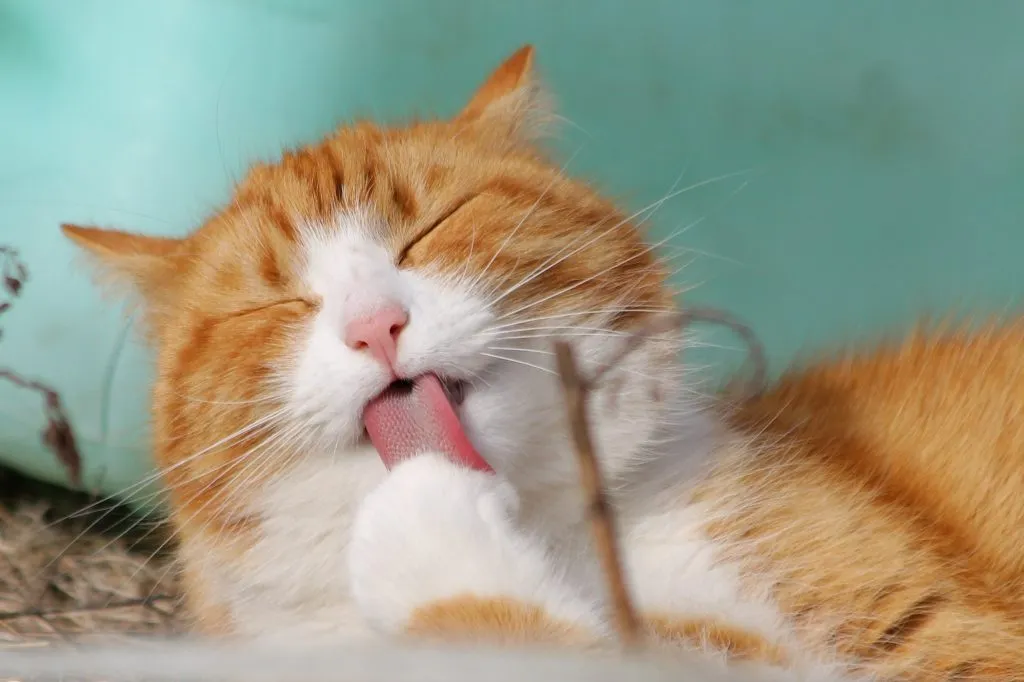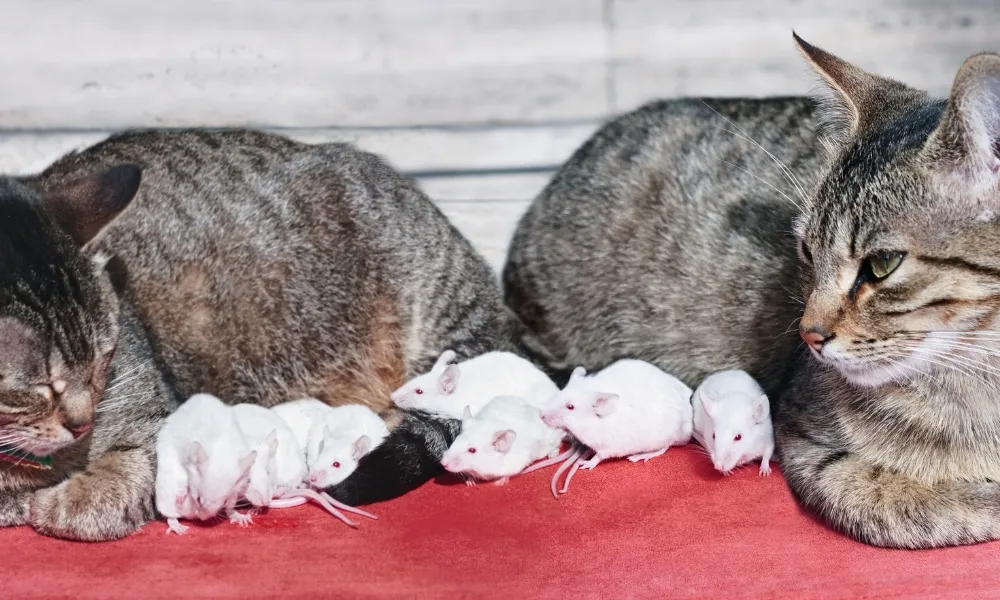You might have heard that having cats as pets can help with mice infestation. This confirms that mice are afraid of cats.
But the question is, why are mice afraid of cats?
The primary reason is that cats are natural predators, and mice are their prey.
Just as cats can detect mice, mice can also detect cat scents.
Mice can sense when a cat is nearby. In fact, mice can locate a cat from their saliva.
But that’s not all. There are other reasons as well. So what are the other reasons why mice are afraid of cats?
Table of Contents
3 Other Reasons Why Mice Are Afraid of Cats
Below are the three primary reasons why mice are afraid of cats.
1. Pheromones
Studies found that mice are reactive to the proteins found in cat saliva and other fluids. They can detect a cat through their noses as their noses have a special Vomeronasal organ.
Mice pick up the protein from the cat, and the organ identifies it as a harmful chemical signal. This chemical scent is known as pheromones.
Most animals know how to identify this scent. When a mouse smells a cat’s urine, it recognizes it as dangerous and tries to run away.
2. Cats are Predators
Cats are hunting carnivorous animals, and mice know it. They are fearful of a cat’s presence as the cat can kill them.
Whenever a mouse detects a cat, it responds by carefully fleeing from the area. But the problem is that cats may not always hunt mice, even if they sense one.
Nevertheless, keeping a cat can sometimes scare off the mouse.
3. Cats are Larger

Cats are way larger than mice. Mice are one of the smallest rodents in our nature. It is only natural for them to fear cats who look like giants in their eyes.
Mice are afraid of cats not only because of their physical feature but also their habits. Cats tend to severely wound a mouse even if it doesn’t kill it.
If the cat hunts the mice, are cats effective for pest control?
Are Cats Enough to Get Rid of Mice?
1. Huge Area Is Not Ideal
Generally, a cat can pretty much keep pests like mice away. They have superior senses that help them hunt mice. Moreover, their presence can threaten mice.
But there are problems with keeping cats as a single resource to get rid of mice.
For a large area, one or more cats will not be enough to hunt mice. Mice are small and fast animals who flee in the mere presence of a cat.
2. Pheromones May Not Be Enough
The pheromones from cat urine can drive off mice for some time. However, it is not a safe form of prevention. This might make mice avoid cats for some time.
However, they will return once they become used to the smell.
3. Inability to Hunt

Most indoor cats do not get rid of mice. They may drive it out of the home, or their scent may keep them away.
But the mice are not hunted and hence are not gotten rid of. The household cats do not like to hunt their prey as they are well-fed and properly taken care of.
4. Disinterest
For indoor cats, mice may become live toys. They will just play with them from time to time without causing any harm.
However, the case could be different if a cat accidentally kills a mouse. Then the killing habit might continue as the cat gets a taste of the mouse.
Problems With Relying on Cats
If you have a pet cat, it might be able to scare off mice for some time. But it is not an ideal solution.
Let’s discuss four major problems with relying on cats for mice infestations.
1. Cats Cannot Reach Nests
Mice are known for building their nests in faraway places where intervention is minimal. They can even build their nests in the insulation part of the freezer.
They choose attics, walls, and other secluded places as their home. It is almost impossible for your cat to be able to hunt mice in a small crack in the wall.
Although the cat can detect and identify these places, it can never reach them.
Another thing is that whenever mice build their home, they make different pathways to help them escape.
The pathways are narrower than the actual living space. So, using a cat to hunt a colony of mice is impractical.
2. Mice Can Harm Cats
Mice can harm cats with their poop and pee. Their droppings are dangerous to cats, humans, and other animals.
Even though mice are not aggressive, they can bite when threatened. The bite may harm your pet and can become infected.
The rodent can also pass ticks and fleas to them while being hunted. If the cat eats the mouse, then it becomes very dangerous.
This is because rodents carry a lot of parasites and infections with them.
Hantavirus or Lyme disease are dangerous diseases that are spread through mice. The parasites and infections a cat catches from a mouse can also be passed to humans.
When you let your cat hunt the mouse, you are also putting the cats and your health in danger.
3. Mice Reproduction
Another major problem with mice infestation is that mice can reproduce rapidly. A mouse starts breeding when it’s 40 days old. It takes only three weeks to have a litter of at least ten pups.
Your cat cannot hunt the whole colony of mice. Some mice will be left that will reproduce. They can then cause a large-scale infestation if left alone.
4. Not All are Hunters
Not all cats will be interested in hunting mice. Pets are well-fed and well-maintained. There is no need for them to work for their meal. That is why many cats may express disinterest in hunting.
Some cats may even be afraid of mice, while others may see it like a plaything. It depends on the cat and how it was brought up.
But one thing is sure cats being perfect killing machines for mice is a myth.
I Have A Cat but Still Have Mice? (What Do I Do)
Cats can make your house less ‘friendly,’ to mice. But setting up traps along with cats can help with a mouse infestation.
Do not use poison as it can harm your cat. You can also use traps. They can effectively encage the mouse without harming it.
Another great way to deal with a mouse infestation is to hire professional help. Seeking professional help can help you get rid of mice without any hassle.
The cats might be able to prevent a further infestation with their pheromones and scents. Professional help is the most practical and cost-effective way to deal with mice.
Will A Fake Cat Scare Mice?
No, a fake cat will not scare away mice as the mice are not scared of the cat’s figure. The mice are scared of the scents that the cat has.
The fake cat is made of polyester, cotton, or other materials. Even if you somehow manage to give that stuffed cat some cat smells, it will wear off. So, the fake cat will not work as an effective way to drive out mice.
How Long A Mouse Can Hide from A Cat?
It depends. However, on average, it takes a cat one to three hours to kill a mouse.
If the mouse can get away from the cat and hide in places the cat cannot reach, then it is safe. The cat cannot go into narrow places or places like the refrigerator, wall crevices, etc.
Mice have narrower hideaways and pathways, for this reason, to escape from the predator.
What Are the Best Cats for Catching Mice?
Please refer to the table below to learn some of the best cats for catching mice.
| American Shorthairs | used for their mouse-hunting abilities for centuries, they are also great companions. |
| Maine Coon | the largest domesticated cat breed with lush fur is also one of the best mousers; what more to ask? |
Siberian | these cats are thick-coated, but their quickness and alertness make them skilled hunters. |
| Persian Cats | intelligent and deceptive cats and females of this breed are known for hunting. |
| Japanese Bobtail | specially bred for hunting mice in silk factories |
| Manx | a skilled predator, good with hunting mice both onboard a ship and on dry land. |
| Turkish Angora | are both intelligent and excellent hunters, this breed secures a bond with their caregiver. |
| Siamese | popular hunters |
| Chartreux | these cats are muscular in form and are skilled hunters |
| Burmese | entertaining hunter breed |
Recap
Mice are no doubt afraid of cats. Cats are large, and they also have natural hunting instincts for mice.
In addition, the Vomeronasal organ in mice helps them detect cat pheromones.
But owning a cat is not the answer to mice infestation. Your cat cannot eliminate all the mice. Moreover, mice can reproduce quickly, and it is impossible to get rid of them.
They can also cause serious harm to you and your pet cats with their droppings, parasites, and infections.
Hence, hiring professionals is the best idea to ensure the safety of you and your cat.
It will also help you to stay away from diseases that mice might carry. Read Do Mice Carry Rabies? to know if mice are prone to carry rabies!
